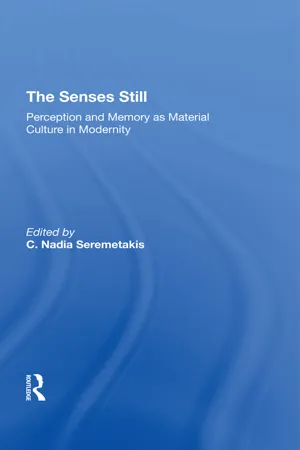
The Senses Still
Perception And Memory As Material Culture In Modernity
- 149 pages
- English
- ePUB (mobile friendly)
- Available on iOS & Android
The Senses Still
Perception And Memory As Material Culture In Modernity
About This Book
How can culture and experience be conceptualized when theorists drag social meaning back and forth between institutions, objects, or acts, as if the dense communication between persons and things were only a quick exchange between surfaces? This volume challenges mentalist approaches to material culture through the historical and ethnographic analyses of sensory memory. The sensory landscape and its meaning-endowed objects bear within them emotional and historical sedimentation that pose crucial questions: What cultural practices enable the sensory-affective experience of history? How does the history of perception speak to the perception of history? The editor, in her four essays, discusses sensory memory as a cultural form not limited to the psychic apparatus of a monadic, pre-cultural, and ahistorical subject but embedded and embodied in a dispersed surround of created things, surfaces, depths, and densities that are stratigraphic sites of sensory biography and history. The volume demonstrates that any ethnographic discussion of the senses involves a priori claims about modernity. Thus the senses are explored in contemporary political and racial violence, exchange practices, the emotions, national identity, food-ways, spatial organization, leisure activity, and the electronic media. Well-known authors examine personal and social investments in objects and substances as the tip of a submerged collective language of materiality that firmly grasps the mutable structure of contemporary experience. Social memory is treated as a meta-sensory organ and shown to be a culturally mediated performance that is activated by material acts and emotionally tangible artifacts.
Frequently asked questions
Information
Table of contents
- Cover
- Half Title
- Title
- Copyright
- Contents
- Prologue
- 1 The Memory of the Senses, Part I: Marks of the Transitory
- 2 Intersection: Benjamin, Bloch, Braudel, Beyond
- 3 The Memory of the Senses, Part II: Still Acts
- 4 The Cinema Screen as Prosthesis of Perception: A Historical Account
- 5 On the Move: The Struggle for the Body in Sweden in the 1930s
- 6 From Desert Storm to Rodney King via ex-Yugoslavia: On Cultural Anaesthesia
- 7 “Conscious” Ain’t Consciousness: Entering the “Museum of Sensory Absence”
- 8 Implications
- About the Book and Editor
- About the Contributors